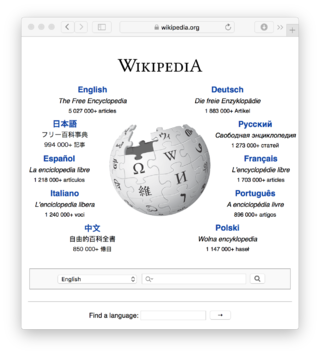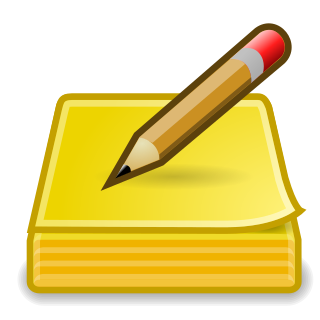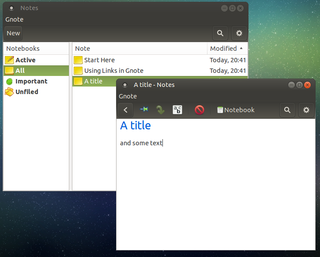
Wiki software is collaborative software that runs a wiki, which allows the users to create and collaboratively edit pages or entries via a web browser. A wiki system is usually a web application that runs on one or more web servers. The content, including previous revisions, is usually stored in either a file system or a database. Wikis are a type of web content management system, and the most commonly supported off-the-shelf software that web hosting facilities offer.

Xfce or XFCE is a free and open-source desktop environment for Linux and other Unix-like operating systems.
TWiki is a Perl-based structured wiki application, typically used to run a collaboration platform, knowledge or document management system, a knowledge base, or team portal. Users can create wiki pages using the TWiki Markup Language, and developers can extend wiki application functionality with plugins.

DokuWiki is an open source wiki application licensed under GPLv2 and written in the PHP programming language. It works on plain text files and thus does not need a database. Its syntax is similar to the one used by MediaWiki. It is often recommended as a more lightweight, easier to customize alternative to MediaWiki. The 'Doku' in DokuWiki is short for Dokumentation which in German means documentation.

Tomboy is free and open-source desktop note-taking software written for Microsoft Windows, macOS, Linux, and BSD operating systems. Tomboy is part of the GNOME desktop environment. As Ubuntu changed over time and its cloud synchronization software Ubuntu One came and went, Tomboy inspired various forks and clones. Its interface is a word processor with a wiki-like linking system to connect notes together. Words in the note body that match existing note titles become hyperlinks automatically, making it simple to construct a personal wiki. For example, repeated references to favorite artists would be automatically highlighted in notes containing their names. As of version 1.6 (2010), it supports text entries and hyperlinks to the World Wide Web, but not graphic image linking or embedding.
This article provides basic comparisons for notable text editors. More feature details for text editors are available from the Category of text editor features and from the individual products' articles. This article may not be up-to-date or necessarily all-inclusive.
The following tables compare general and technical information for many wiki software packages.
An autolink is a hyperlink added automatically to a hypermedia document, after it has been authored or published. Automatic hyperlinking describes the process or the software feature that produces autolinks. Segments of the hypermedia are identified through a process of pattern matching. For example, in hypertext, the software could recognise textual patterns for street addresses, phone numbers, ISBNs, or URLs.

TiddlyWiki is a personal wiki and a non-linear notebook for organising and sharing complex information. It is an open-source single page application wiki in the form of a single HTML file that includes CSS, JavaScript, embedded files such as images, and the text content. It is designed to be easy to customize and re-shape depending on application. It facilitates re-use of content by dividing it into small pieces called Tiddlers.
Mobipocket SA was a French company incorporated in March 2000 that created the .mobi e-book file format and produced the Mobipocket Reader software for mobile phones, personal digital assistants (PDA) and desktop operating systems.
Turbo is a set of software products and services developed by the Code Systems Corporation for application virtualization, portable application creation, and digital distribution. Code Systems Corporation is an American corporation headquartered in Seattle, Washington, and is best known for its Turbo products that include Browser Sandbox, Turbo Studio, TurboServer, and Turbo.

The Universal Edit Button is a browser extension that provides a green pencil icon in the address bar of a web browser that indicates that a web page on the World Wide Web is editable. It is similar to the orange "broadcast" RSS icon that indicates that there is a web feed available. Clicking the icon opens the edit window. It was invented by a collaborative team of wiki enthusiasts, including Ward Cunningham, Jack Herrick, and many others.

Gnote is a free and open-source desktop note-taking application written for Linux, cloned by Hubert Figuière from Tomboy. It uses a Wiki-like linking system to connect notes together. Gnote is part of the GNOME desktop environment, often filling the need for personal information management. The main principle is a notepad with a wiki-style interface. Words in the note body that match existing note titles automatically become hyperlinks, allowing for the management of large libraries of personal information, such as references to favorite artists that would then automatically be highlighted in notes containing their names. Plugins extend the program to include functionality like exporting to HTML and printing support. As of version 0.8.0, Gnote has been ported to GTK+3.
The following outline is provided as an overview of and topical guide to the Perl programming language:

Zim is a graphical text editor designed to maintain a collection of locally stored wiki-pages, a personal wiki. It works as a personal knowledge base and note-taking software application that operates on text files using markdown. Each wiki-page can contain things like text with simple formatting, links to other pages, attachments, and images. Additional plugins, such as an equation editor and spell-checker, are also available. The wiki-pages are stored in a folder structure in plain text files with wiki formatting. Zim can be used with the Getting Things Done method.

Foswiki is an enterprise wiki, typically used to run a collaboration platform, knowledge base or document management system. Users can create wiki applications using the Topic Markup Language (TML), and developers can extend its functionality with plugins.

Nimbus Note is a note-taking app designed by Nimbus Web company based in Cleveland, Ohio. The app is cross-platform, for Android, iOS, macOS, and Microsoft Windows.

Obsidian is a personal knowledge base and note-taking software application that operates on Markdown files. It allows users to make internal links for notes and then to visualize the connections as a graph. It is designed to help users organize and structure their thoughts and knowledge in a flexible, non-linear way. The software is free for personal use, with paid commercial licenses available.










